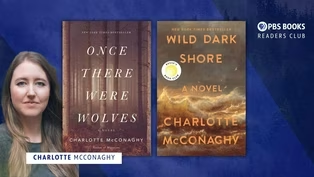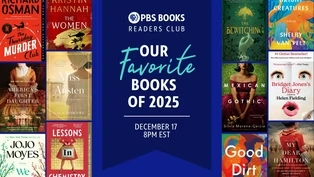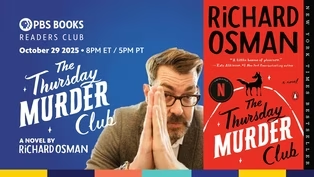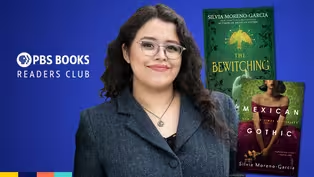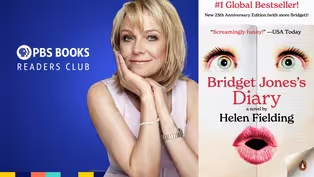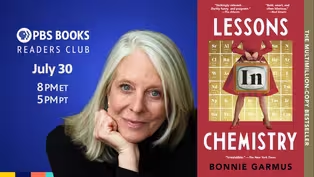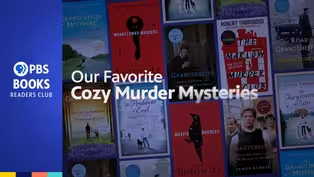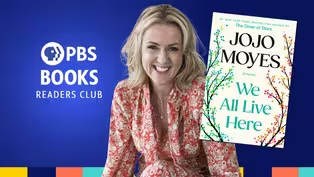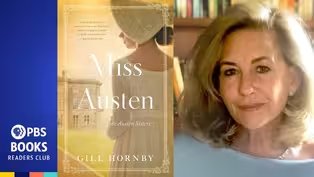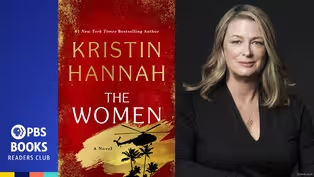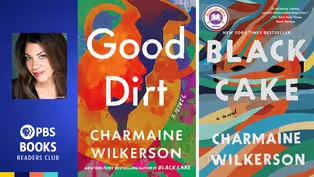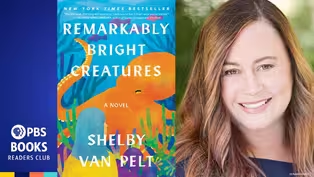
Readers Club | Ep. 211: America's First Daughter | Stephanie Dray & Laura Kamoie
Season 2025 Episode 64 | 1h 1m 45sVideo has Closed Captions
PBS Books Readers Club welcomes co-authors Stephanie Dray and Laura Kamoie
PBS Books Readers Club welcomes co-authors Stephanie Dray and Laura Kamoie to discuss their New York Times best-selling historical novel America’s First Daughter. Grounded in thousands of Jefferson’s letters, this novel blends meticulous research with powerful, emotional storytelling. The result is a vivid & intimate portrait of a woman whose resilience and influence helped shape both her family.
Problems playing video? | Closed Captioning Feedback
Problems playing video? | Closed Captioning Feedback

Readers Club | Ep. 211: America's First Daughter | Stephanie Dray & Laura Kamoie
Season 2025 Episode 64 | 1h 1m 45sVideo has Closed Captions
PBS Books Readers Club welcomes co-authors Stephanie Dray and Laura Kamoie to discuss their New York Times best-selling historical novel America’s First Daughter. Grounded in thousands of Jefferson’s letters, this novel blends meticulous research with powerful, emotional storytelling. The result is a vivid & intimate portrait of a woman whose resilience and influence helped shape both her family.
Problems playing video? | Closed Captioning Feedback
How to Watch PBS Books
PBS Books is available to stream on pbs.org and the free PBS App, available on iPhone, Apple TV, Android TV, Android smartphones, Amazon Fire TV, Amazon Fire Tablet, Roku, Samsung Smart TV, and Vizio.
Providing Support for PBS.org
Learn Moreabout PBS online sponsorshipMore from This Collection
The PBS Books Readers Club is a monthly digital-first series that brings its members into conversations behind the stories of your favorite books & shows. You can watch the online on the PBS App, with extended interviews available for PBS members on PBS Passport.
Readers Club | Ep 301: Charlotte McConaghy | Once There Were Wolves
Video has Closed Captions
PBS Books Readers Club hosts author Charlotte McConaghy to discuss her novel Once There Were Wolves. (58m 55s)
Readers Club | Ep. 212: Our Favorite Books of 2025
Video has Closed Captions
PBS Books Readers Club celebrates the wrap of its second season with a highlight of 2025 (47m 55s)
Wed Oct 29 2025 | Readers Club | Ep. 210: Richard Osman | Thursday Murder Club
Video has Closed Captions
PBS Books Readers Club welcomes celebrity writer Richard Osman to discuss his best-selling novel (52m 44s)
Readers Club | Ep. 209: Silvia Moreno-Garcia | The Bewitching and Mexican Gothic
Video has Closed Captions
PBS Books Readers Club welcomes award winning author Silvia Moreno-Garcia to discuss her new book. (52m 42s)
Readers Club | Ep. 208: Helen Fielding | Bridget Jones's Diary
Video has Closed Captions
PBS Books Readers Club welcomes beloved British author Helen Fielding to discuss her iconic novel (59m 30s)
Readers Club | Ep. 207: Lessons in Chemistry | Bonnie Garmus
Video has Closed Captions
PBS Books Readers Club welcomes international best-selling author Bonnie Garmus to discuss her novel (49m 3s)
Readers Club | Ep. 206: Our Favorite Cozy Murder Mysteries
Video has Closed Captions
PBS Books Readers Club hosts a special event sharing Our Favorite Cozy Murder Mysteries (52m 32s)
Readers Club | Ep. 205: We All Live Here | Jojo Moyes
Video has Closed Captions
PBS Books Readers Club welcomes international & New York Times best-selling author Jojo Moyes (57m 37s)
Readers Club | Ep. 204: Miss Austen | Gill Hornby
Video has Closed Captions
PBS Books Readers Club welcomes international best-selling author Gill Hornby to discuss her novel (51m 18s)
Readers Club | Ep. 203: The Women by Kristin Hannah
Video has Closed Captions
PBS Books Readers Club welcomes international best-selling author, Kristin Hannah to discuss novel. (53m 29s)
PBS Books Readers Club | Ep. 202: Good Dirt & Black Cake | Charmaine Wilkerson
Video has Closed Captions
PBS Books Readers Club is delighted to welcome critically acclaimed author Charmaine Wilkerson (55m 29s)
PBS Books Readers Club | Episode 201 | Remarkably Bright Creatures | Shelby Van Pelt
Video has Closed Captions
PBS Books Readers Club launches season two with award-winning author Shelby Van Pelt. (57m 40s)
Providing Support for PBS.org
Learn Moreabout PBS online sponsorship(bright classical music) - We really did not have to juice up much of Jefferson's life.
It was extremely exciting.
Patsy Jefferson's life was much more tumultuous than we would've ever guessed.
I know some readers think it gets pretty soapy, especially in the later periods.
We did not invent any of that.
The crazier something is in historical fiction novel, the more likely it is to be true.
(bright classical music continues) - Well, hello and welcome to the "PBS Books Readers Club."
- Today, we welcome New York Times Bestselling authors, Stephanie Dray and Laura Kamoie, to discuss their powerful historical fiction novel, "America's First Daughter."
- "America's First Daughter" tells the sweeping story of Martha "Patsy" Jefferson, the eldest daughter of Thomas Jefferson.
From the heartbreak of losing her mother to traveling to Paris with her father and standing beside him through the birth of a nation, Patsy becomes his confidant and protector.
More than just a witness, she shapes American history through her strength and influence.
- Based on thousands of Jefferson's letters, this novel balances historical accuracy with deep emotional storytelling.
It's a moving portrait of a woman who shaped both her family and America's early years.
- Hi, I am Fred Nahhat here with Lauren Smith from PBS Books, joined by literary expert and award-winning writer, the Princess Weekes, (Princess laughs) and our PBS Books national director and resident librarian, Heather-Marie Montilla.
- And, of course, we want to welcome you and all of your fellow book clubbers.
We wanna hear from you in the comments.
Let us know where you're joining us from.
And if you've read "America's First Daughter" yet and what you thought about the book.
Also, let us know if you read "My Dear Hamilton."
We hope to touch on that book today as well.
- Well, we love reading and responding to your thoughts in the chat.
And you can connect around books all month long by joining the PBS Books Readers Club Facebook group to share recommendations and discuss your favorite reads anytime.
- Really is the best book club ever.
And great stories are meant to be shared, so click Share on Facebook or YouTube right now.
Your support means the world to us, and we know you'd never let your book buddies miss out on a great story.
- All right, so let's discuss (speakers chuckle) Stephanie Dray and Laura Kamoie's unforgettable novel, "America's First Daughter."
What did we think?
- Oh, I loved it.
So- - Historical fiction girl.
- Yes, I am historical fiction.
- It's your time.
(laughs) It is my time, and not only that, I love in the back, they have author notes so you know how history really influenced, like actual history, influenced what they were writing.
And they, even for "My Dear Hamilton," talk about the difference with the play, the musical, and the book, or where things deviated.
For me, it's about really understanding fact and fiction and where they come together and where they separate.
And they did such a good job and they did so much research.
- Absolutely.
You know, we hear so much about the Founding Fathers, to think about the women who were standing beside them who are really helping to shape the way that they were able to lead is so important.
I think whenever we get the insight of the woman's perspective during the founding is so important.
And also, I think both of these books do a lot of nuanced work to talk about how complicated even that mentality was in its time so that we, as the modern readers, can empathize with them, even if we don't always agree with them.
- Oh, right.
- And I think that's a really testament of their great research and storytelling.
- The history of this country is so unbelievable to me.
The malevolent hypocrisy- - Yes.
- All of that that went into the founding of this nation, and as it plays out in the context of this novel, it's accepted fact.
And I just have to note, even though I could go on and on about what is so unbelievable and abhorrent about those issues, I could talk about that for two hours straight.
We're not gonna do that, but just know I could.
(Lauren laughs) - [Princess] Yeah.
I'd be right there with you.
- I mean, I'm here for it.
- Yeah.
- So, just now to review it as a critical piece, it's scholarly work, it's also historical fiction.
I would just say, "Daddy issues, anyone?"
- For sure.
- Oh God.
- Oh, I mean, everybody had 'em, Patsy, of course, but also Tom to a fairly well with the, you know, the Randolph crew, Polly, Ann, Jeff, everybody.
Jefferson's reach was long and influential.
- But what about the fact that you think about our country at any moment was hanging on by a thread?
- Yeah.
And, like, a duel, right?
How many duels were there at this period?
Like we get in a fight, "I'm gonna duel you."
Right?
(Lauren laughs) - I'm gonna call you out.
- Yeah.
- I'm gonna call you out.
- You're gonna die.
- You'll die.
(speakers laugh) Like, that happens so frequently, and it really makes you understand that it is an American experiment.
We are the results of an American experiment.
And as we think about America250 to really reflect on this period and how amazing and how far we've come.
We certainly are not perfect, but we've come so far, and that's impressive.
- Yeah.
- We try not to duel anymore.
- Yeah.
- This is what I love about historical fiction because it brings the stories to life.
Like we've learned about the American Revolution, and there's gonna be a lot of talk about it.
So, there are plenty of biographies and histories that you can dive into, but there's something about historical fiction that sort of makes the timeline stick in a way.
Like watching the American Revolution happen through Patsy's eyes, starting out as a small child, how she was involved in the French Revolution.
And then even as a grown woman with adult children, there is still a lot happening in the founding of the nation.
- Yes.
- So, to see it play out in that way sort of helps the history stick in a different way, and also to see it through somebody's eyes that you don't normally hear about, to get in the mind of, you know, a female character.
Who knows what she said- - Right.
- To Thomas Jefferson that might have influenced the way that he thought?
And besides Patsy, Sally.
- Oh, yeah.
- What was she talking about- - For sure.
- And dealing with that.
- with Jefferson in their private moments that might have influenced our country?
- Yeah.
- I think all of that is just so fascinating.
- Yeah.
- And I think, to your both points, is that I think this book really handles the hypocrisy and conflict in such an enlightening way.
Because I think when we say Founding Fathers, it make it seem like they were all hanging out and, like, getting a Guinness or Sam Adams and this.
(speakers laugh) But it's like, no, even from the very beginning, there were so much strife, and I forget that Jefferson was not actually in America during the revolution 'cause he was an ambassador in France, and I'm just like, "How does that shape your ability to lead a country?"
It's really fascinating.
We have a really fascinating country.
- Yeah, he couldn't jump on a Zoom.
- Exactly.
(laughs) - [Princess] Or not even a Google Meets.
(speakers laugh) - And flawed, and this is not your powdered wig, Hall of Presidents Thomas Jefferson.
This was all of his flaws laid bare.
Really an incredible job based on the letters, which I think made it really profound.
- Absolutely.
- Yep.
- All right, well authors Stephanie Dray and Laura Kamoie are standing by to join us in just a moment to talk more about their captivating novels.
But first, we wanna make sure you're set up to stay in the loop on PBS Books' "Author Talks."
Here's what you need to do.
First, sign up for our PBS books e-newsletter at pbsbooks.org/subscribe for exclusive book recommendations, author interviews, and more.
It is the best way to get the latest updates straight to your inbox.
- Yeah, it's really good.
And you don't wanna miss the next ones because we're gonna have "Our Favorite Books of the Year"- - Yes.
- In that newsletter.
It's a wonderful list.
You're gonna wanna make sure you have that.
So, after you subscribe to the newsletter, click over to YouTube and hit Subscribe there.
Because the PBS Books YouTube channel features hundreds of author interviews, including Geraldine Brooks, Percival Everett on his Pulitzer Prize winner, "James," Kristin Hannah on "The Women," Shelby Van Pelt on "Remarkably Bright Creatures," and so many more.
- And if you love the "PBS Books Readers Club," consider supporting your local PBS station.
Now, more than ever, this program and your PBS station are counting on support from viewers just like you.
So, please, if you can, visit pbsbooks.org/donate to make a gift.
- [Lauren] It really is a very critical time for PBS, PBS stations, and this show.
Your gift can really make a big difference right now.
So, that link, pbsbooks.org/donate, will take you right to your local station's giving page.
There, among the thank-you gift options, you can support PBS Books directly by selecting one of our special gifts, like the PBS Books Readers Club bag.
You can carry that one as a handbag or you can wear it as a cross body.
I wore it to the cider mill yesterday- - Yesterday.
- As a cross body, and it was super great.
Also brought it to the airport with me.
You can stash your laptop, your wallet, snacks, of course, a few books as well.
- That's terrific.
We also have the official PBS Books Readers Club mug, just like we have here on the set holding my green tea today.
Says "My Weekend is BOOKED!"
on the other side, and ain't that the truth?
- [Lauren] It sure is.
And don't forget, PBS members also get access to PBS Passport, the member-exclusive section on the PBS app where you can stream full seasons of incredible PBS shows.
This month's Watch-A-Like is "The American Revolution," an incredible film by Ken Burns, Sarah Botstein, and David Schmidt.
This much anticipated six-part documentary series explores the country's founding struggle and its eight-year war for independence.
an expansive look at the virtues and contradictions of the war, and the birth of the United States of America.
The film follows dozens of figures from a variety of backgrounds to paint a captivating picture of America's founding and the war that turned the world upside down.
You can stream the series now on pbs.org or the PBS app.
- And now let us turn the page to our book pick for this month, "America's First Daughter" by authors Stephanie Dray and Laura Kamoie.
Welcome to the "PBS Books Readers Club."
Thanks for joining us.
- Thank you, we're so honored to be here.
- Thank you so much!
- We have lots of talk about.
Let's start at the beginning.
What captured your interest around this story and why did you think it was an important story to be told?
- Well, you know, Laura and I came up with the idea for this story.
We were in a conference together and we were talking about classes that she was teaching at the US Naval Academy on Thomas Jefferson.
And we were discussing how conceivably everything that you would think had been or could be written about Jefferson had been written about Jefferson, but then we realized that we hadn't read anything about his daughter, and we got very excited to explore the idea of Jefferson as a father and not just a founding father.
- Well, I think it's just so incredible that you co-wrote this together.
So, would you please walk us through your process as collaborators?
How do you divide the research, the draft, and the editing, and how do you keep one seamless voice as you go back and forth throughout all of that?
- When we had the idea that night, neither of us had ever co-written something like this, so we went into it with probably a good bit of hubris and a lot of excitement and hope.
And I think our process has been different with each book that we have written.
With this one, we drafted an outline together, we did a lot of the initial research together, and then we divided it up into chapters that we would each write.
And initially, we actually wrote while we were on a Google video chat together, so Stephanie would be drafting chapter 1 and I would be drafting chapter 2, and we would come across things that we would think were maybe helpful for the other person, and we could sort of talk about that in live moment.
And then we would switch what we had drafted and edit freely.
And I think the editing freely was one part of achieving a seamless voice.
And the other was that we almost always accepted 95% of the other person's changes.
And found through the process that we had, you know, complimentary strengths, so what I would add would strengthen what Stephanie had drafted, and vice versa.
And where we disagreed, and this was always, I think, some of the most fun moments for us, we would each sort of say what we were trying to achieve, and then together, we would come up with a third solution that was so much better than what either of us could have achieved on our own.
And so, it became this really dynamic and gratifying process because we could see that it was getting stronger through the collaboration, and that was really exciting.
- Just to follow up, would you mind giving us an example of a moment like that, where you both had to kind of kill your darling to create a new darling?
(laughs) Right.
(speakers laugh) - I think we agreed on almost everything for "America's First Daughter," but there was one in the opening lines where we couldn't come up with a third solution, and that was the one time that we asked our editor to be a tiebreaker.
And she sided with Laura, so you'll never know what I would've put in that line, but it's not there.
- Oh.
- Oh.
- I'm reading the first line.
"Sons of a revolution fight for liberty.
They give blood, flesh, limbs, their very lives, but daughters, we sacrifice our eternal souls."
That's really good.
- I agree with that one.
- Yeah.
- That's really good.
- Yeah, really good.
(speakers laugh) Thank you.
- Seldom do we find true collaboration.
I know that this novel, it relies on thousands of Jefferson's letters.
As historians, how do you approach this mountain of primary source material?
And as novelists, how do you transform them into this compelling fiction?
- I think one of the things that I wanna say to start this off is that for me, as someone who has written nonfiction history, the process that we went through in engaging with the primary source material was exactly the same as one that I would have done writing nonfiction, which is, we started with the primary source material, we let it guide us in figuring out what we wanted to say and how we wanted to say it, and then we used the secondary source material to sort of help shape the narrative.
And I think, you know, critical to the process for all of our books really has been the huge resource of digitized and transcribed primary source materials available to all people on the National Archives website.
So, I think, you know, one of our approaches was to always allow the historical figures to speak in their own words, if at all possible, and that came right out of the documents.
- And I am curious, in going through all that information, where and why did you add artistic license?
There's the fact and then there's the imagineering of it all.
Was it because there was gaps in the historical record or it just needed to be juiced up and maybe linked to another clause or stanza?
- So, I think it's important for people to understand that historical fiction is an art form.
It is different from biography fundamentally.
And we have a different job than historians.
Now, Laura is also a historian as well as novelist.
I am a historical novelist only.
I don't have her training.
But when we approach historical fiction, we know that our job is to take a side in a way that historians cannot.
They are trying to tell you what they know happened, but we have to speculate.
We have to make educated guesses about what we think happened and then support it, both with our evidence and with our imagination.
And we really did not have to juice up much of Jefferson's life.
It was extremely exciting.
Patsy Jefferson's life was much more tumultuous than we would've ever guessed.
I know some readers think it gets pretty soapy, especially in the later periods.
We did not invent any of that.
The crazier something is in historical fiction novel, the more likely it is to be true.
So, yes, all the domestic violence was true.
The crazy murder trial, that was all true.
(laughs) So, our job is, is basically to flesh it out and to make sure that the reader feels something about it and to make sure that it's shaped like a story, because people's real lives seldom shape themselves into a narrative form, and we have to make it do so.
- Your point about lack of source material is part of what makes women's stories such good arenas for writing historical fiction.
Because whereas there were, I think at the time, something like 18,000 available Thomas Jefferson letters, there were something like 200 available Patsy Jefferson letters on the National Archives website.
So, that just tells you a lot about the difference between what's been preserved of a famous man's history and what's been preserved of a famous woman's history.
And you, therefore, don't have as much source material to really pull from, and that requires, therefore, more speculation, more dramatization, but informed.
Informed by other letters, informed by other source material, informed by perhaps another woman's similar experience, if it wasn't Patsy's, for example.
And so, we very much feel like even though it is historical fiction, it is still based on good source material and makes real historical contributions.
- I wonder what the primary source material is gonna be like looking back on a... Like, I hope no one's going- - Oh, yeah.
- Through the National Archives looking at my Snapchats.
'Cause they're gonna get- - Oh God.
- A portrait of a ridiculous person.
(Princess laughs) (Lauren laughs) - Instagram is gonna be the best primary source for something.
- Oh my gosh.
- The digital age raises real challenges for archivists and librarians, so it will be really interesting.
- Yeah.
Speaking of a lack of source material, let's talk a little bit about Sally Hemings.
How did you approach writing her character and how much do you think that she might have influenced Jefferson's thinking and life that we maybe just don't even know about?
- When we were deciding how to approach the character of Sally Hemings, we were very aware that there is nothing extent in this woman's own voice, even though it is believed that she was literate.
So, we had to infer a lot of her personality from choices that she made, but we also were careful not to put words in her mouth, if we could avoid doing so.
And we also made sure that she was somewhat inscrutable.
We wanted the reader to decide what her thinking was, because she was somewhat opaque to the Jefferson.
She was, as an enslaved person, naturally guarded.
And I don't think that, certainly Patsy Jefferson, ever really had a true read on Sally Hemings's feelings one way or the other.
So, we made a conscious decision not to make those choices for her either.
- Well, I will say this.
Sally Hemings's son believed that Jefferson loved Sally.
We don't really know the reverse, but that would seem to indicate, at least in their son's mind, that she was someone who he cared about, whose opinion he very likely valued.
And so, I believe it is entirely possible that she influenced him in ways that we will never know about.
- But knowing that they had this sort of relationship indicates that she did impact his thinking.
And certainly, the revelation about the relationship that took place during his presidency impacted policies that he pursued.
I think he was actually quite constrained after this came out to pursue anti-slavery policies, and isn't that a great American tragedy?
- Yeah.
- Absolutely.
- Connected to that, Jefferson's complicated legacy, as well as with slavery, as well as Patsy's, you write honestly about the fact that they both recognized that slavery was wrong, and yet continue to live within it and also benefit from it.
How did you navigate this very tricky situation of portraying it accurately without excusing it, while also really staying true to what was written in the time?
- I hope we achieved that.
I think that the paradox of American freedom and American slavery coexisting is and continues to be the founding problem of our nation.
And I think one of the ways that we addressed it is that it sort of seemed like Patsy and Jefferson interacted differently with the institution.
I think it's very clear through the novel that even though Patsy loves Thomas Jefferson, he was a deeply flawed man.
And not only as a founding father, he was also a flawed father in many instances throughout her life.
And so, I think one of the things that we tried to do was, to the extent we lionized Jefferson at all, it was only through the eyes of a daughter, not as an inherently perfect or unproblematic person, you know, in absolute terms.
- And to be honest about this, we wanted to make sure that the reader both saw that there were economic and social challenges in bringing the enslaved people on Monticello, but also that you can't say it was only because he was a product of his time, because there were contemporaries, including William Short, who plays the very prominent role in the novel, and Ben Franklin and other contemporaries who were much more active in the realm of abolition of slavery.
So, we wanted to show a balanced portrait of this, and I hope that we achieve that and that we give an honest of it.
- I found both books, including the passages we get about in "My Dear Hamilton," really do touch on what you're saying about, like, there was always people who thought that this was wrong and that it was deplorable, and how many people became complicit because of the economic benefits of it more than anything else in a lot of ways.
But actually, going back to your point about Patsy and showing everything through her eyes, I think that there's a real emotional weight in highlighting Patsy's role as not just Jefferson's daughter, but as someone who bears the responsibility of protecting his legacy, shaping it through being the defacto first lady.
So, I'm wondering, how did you, with only, you know, those 200 primary sources, shape her character arc between loyalty to her father, her own inner doubts and desires, and the role that she played in history?
- Well, one of the most exciting things for us, and what really shaped Patsy for us in our minds is, when we discovered a story that I don't even think is in the book, and this this really happened.
On Patsy Jefferson's deathbed, or what she thought was her deathbed towards the end of her life, she gathered all of her children that were alive to her and she said, "I need you to know that the rumors about your grandfather and Sally Hemings are not true and that you can disprove this by using the Farm Book, we have records to show that it's not true, and you must defend his reputation when I'm gone."
Now, there is zero chance that Patsy Jefferson did not know that she was lying.
The Farm Book, in fact, proves just the opposite.
It is evidence of this relationship.
And so, we thought, "What kind of woman wants to lie on her deathbed with her last breath?"
And that shaped her for us because that told us what kind of person she was, what she valued, that her defense of her father and her belief that defending him was defending the country was the defining characteristic of her as a person.
And so, that's what we ran with.
- And also, you know, why and how would she get to this terrible moment when she thinks she's dying and she, you know, perpetrates this lie to the country and to her own children?
And that was why it was really important that the book start when Patsy was a child and start when this moment when she lost everything in losing her mother, and believed that she was on the verge of also losing her father.
You know, there's very much sort of a psychological study that's happening here for us in how do we get from point A to point Z?
And as we asked that question, things that we saw Patsy doing that we had historical evidence for, all of a sudden, started making more sense.
- Yeah, I said somewhat glibly to the panel earlier, "Daddy issues, anyone?"
And so, certainly, (Stephanie chuckles) there's a psychology.
- Yeah.
- But also, I'm wondering about the role France plays in this story, and was there a difference in the way that Patsy viewed Jefferson on American soil and the experience of being a minister in France and what it was like to research those scenes and that piece of this history?
- Oh, we had so much fun writing those scenes in France.
What a break it gave us from the plantations.
(laughs) Plus, you know, historically, this is all true, but it puts us, it puts the Jeffersons, and it puts the readers in one of the most exciting times in history because not only is the United States in revolution, but we get to see France in its early days of revolution when it was the exciting, idealistic point before most of the violence took place, and this was really the cradle of the enlightenment.
So, of course, she sees her father in that pantheon of enlightenment figures, and that was exciting for her, but, of course, it's very exciting for us as writers too.
- Yes, and I think also the fact that Patsy had choices and options for potentially a different life that she ultimately sacrificed for her father, I think that that plays a big role in how she sees what her role and her purpose is once she returns to Virginia.
And so, I do think that that shapes her, her relationship with her father, and how she sees herself going forward.
- So, as you delved into this really exciting time, did you get to go to France to do more research and did you have to read any letters in French?
- We did not get to go to France, which was, yes, that's a shame.
I had actually been there a year or two before and had taken a bunch of pictures and had sort of walked in some of Patsy's footsteps without realizing it at the time.
But the most exciting thing was actually about some French letters.
I'm gonna let Stephanie tell that story.
- Mostly, we did not have to read letters in French, but after we had finished the book and we had turned it in, it was past copyedits, it was in first-pass pages, which is the point, for those who don't know, where you're only supposed to change typos, if you see, you know, a misplaced comma, something like that.
We were just at that stage of turning it in when we received news that Monticello had found and released new letters, and they were mostly from Patsy in her time in France.
And Laura was so excited, she was like- - "Oh my gosh, new letters!"
- "Oh my God, yay!"
And I was Eeyore, like, "Oh my God, this is terrible!"
Our book will be out of date (speakers laugh) before we even publish it!
This is awful!"
And so, we had to go to the publisher and plead with them, would they allow us to read and sometimes translate these letters and see how they impacted the book?
And thankfully, we had a wonderful editor, and the publisher was wonderful about this and they allowed us to read the letters, and some of them were in French and we had to figure out what they meant.
And that's when we found the anonymous love letter about Patsy leaving, and that, of course, confirmed our sort of book theory about William Short.
And we also discovered a letter from Patsy's friend in the convent who said, "Mr.
Short said he doesn't love you, but I think he's disagreeing or he's lying."
So, those things really informed our plot and we thought they were very juicy, and we were able to weave them in at the last minute.
In fact, we were in a hotel room together, sitting at one laptop, you know, two-finger typing in these little additions into the manuscript, hoping that we didn't introduce any new errors.
But in the end, it all worked out and we were so delighted by it.
- Divine intervention.
- I know, her ghost was just like, "Wait, I have letters."
- Yeah, (indistinct) love story.
- Destination (indistinct).
- "I had game two."
- Yeah.
(speakers laugh) (Lauren laughs) - Oh, that's a great story.
Thank you for sharing that.
So, talking about Patsy, and obviously, you had some reservations about some of the choices that she made, that story that you told about her lying on her deathbed.
Like, yeah, that reveals her priorities as a person, but were there things that you came to admire about her as well as you got to know her through your research?
- Yes, I think she had enormous amount of grit.
This is a woman was a survivor who, I guess, we had the initial impression that she must have lived a very charmed life.
She's living with her father, the president, who is a wealthy man.
We really had no idea starting out what her life was like and that, you know, she's hauling water on plantations and, you know, doing a lot of difficult work and trying to keep parasites off of children and all sorts of things that we hadn't anticipated.
But she was a survivor, and we really did admire that.
- And she was also someone who often sacrificed her own needs and strength for others.
She was a caregiver for her sisters when her mother died.
She was a caregiver for her father when her mother died.
And there are lots of examples of Patsy doing things like that, giving things up for the benefit of others.
And I think there was a strength about her that we very much came to admire.
I think what's admirable about that is that it teaches us that many women of this era were doing that while actually doing incredibly important, valuable things that deserve to be told and known about.
- Yeah, she had that classic eldest daughter syndrome.
- Oh, yeah.
- Like, I know a lot of us can relate to that even still.
- Yes.
- And oof, she had it bad.
- It was tough.
And, you know, this book has been praised for bringing Patsy out of Jefferson's shadow, but I'm wondering, did writing this book change how you viewed Jefferson personally and the founding era?
'Cause I'll admit, I was already kind of a Jefferson hater, so it wasn't really hard for me, but I just couldn't believe how destitute everything was afterwards.
Like, we talked about this earlier, the idea that, like, the daughter of a president after his passing would be in such dire straits just seems so incongruent with how we think the presidency works today.
- I think we came to it knowing that Jefferson was a complicated fellow.
And then while we were writing it, we came to despise him deeply, especially in those early chapters when he's a terrible father and he's really struggling.
But something that was sort of magical about writing the book, about really writing about any human being for so long of a time period with so many letters, is we actually got to see him evolve as a human being, and we see him become a better father, we see him become a better thinker over time.
He's very sexist at the beginning of his career and by the end of his life, he's looking around and seeing that, really, women are the only competent people around him, and he's acknowledging that.
And he does change and grow and he has regrets.
And so, I thought we, at least I, came to think of him in a more human way than before I had started the book.
- Yeah, I mean, we came to it with what we knew about Jefferson as a founding father, the good and the bad.
There were many text exchanges about how he was the absolute worst when we were writing about Patsy's childhood and he's writing her- - I see those texts.
- Yes.
- Like, "I can't believe he's doing it again!"
Yeah, you know, (speakers laugh) he's writing her these letters being like, "Stop getting pencil on your dress and be a better student."
And she's like, "Dad, I miss you."
And that's how he's responding.
So, you know, there were lots of those kinds of moments, but we really did see him become not only a better father, but he was also, at least to her children, he was an excellent grandfather.
I mean, when one of her children gets shot, you know, here's this 78-year-old man mounting on horseback racing down a mountain to try to save him and get him help.
So, you know, I think we found things to admire in his both intellectual and sort of emotional growth that helped sort of even that out.
But then we went on to write about Hamilton, so then we immediately had to switch back to disliking Jefferson, so.
(speakers laugh) - I was gonna say, I did notice that I'm going right, you know, from, like, the anti-Federalists to the hardcore Federalist, and I'm like, "Oh, man.
(Lauren chuckles) Eliza and Patsy are gonna be feuding."
(speakers laugh) - Well, that seems like a perfect segue for us to talk about "My Dear Hamilton."
What drew you to the character of Eliza Schuyler Hamilton, who obviously is another extraordinary revolutionary woman who was also overshadowed by her husband?
What drew you to her story, which obviously is in the North versus more in the South, and how does it really connect thematically for you with "America's First Daughter"'s?
- You know, when we set out to write "America's First Daughter," that was all we set out to do.
We weren't necessarily setting out to write about other founding mothers, but we so enjoyed process of working together that we started thinking of, you know, "If we did this again, who would be next?"
And we sort of came up with a list of possibilities, and Eliza was on that list, and she was on that list for a couple of reasons.
As you say, you know, she was a founding mother of the North, and if we were going to write another revolutionary era founding mother's story, we wanted it to be substantively different.
And much about Eliza's story was different from Patsy's.
But also what happened was, Stephanie and I went to yet another writer's conference.
This one was in New York City in the summer of 2015, I believe, Patsy's book had not even come out yet, and we both went to the conference a day early.
Stephanie had plans with some other friends, and I went with a friend to see this brand new Broadway show called "Hamilton," an American musical.
And at the intermission, I turned to my friend and I said, "If you've seen it, you know, you know Eliza doesn't really get her full say until the very end of the show."
But at the intermission, I turned to my friend and I said, "Eliza has to be the next book."
The next morning, Stephanie and I had a meeting at our publishers in the cab on the way there.
I, like gushed, about this.
We brainstormed the novel, we pitched it to our editor that afternoon, basically, and then we were off.
Like, before it even exploded into the big phenomenon, we saw the importance of Eliza's story, because in similarity, she was another founding mother who shaped the legacy and a lot of what we know about a major founding father, but in this instance, she was much more of a partner to Alexander than Patsy ever was on the political and public side of Jefferson's life, and that was really exciting.
- I'm very curious to know if you can share, is there another book on the way?
Who's our next portrait?
- (chuckles) There is.
- We are writing about a little known founding mother named Abigail Adams.
- [Speakers] Yay!
- I did it, I manifested.
My destiny is my destination.
(Lauren laughs) - Love that so much (speakers laugh) for all of us.
- Yay!
- That's amazing.
We're very excited.
How's it going?
- It's finished.
We are just working on the copyedits right now, and it will be published on the week of Mother's Day, 2026, and it will be aptly called "A Founding Mother," and it will be out in time for the 250th celebration of Declaration of Independence.
- Ugh, so exciting.
- Congratulations.
We're so excited.
- So exciting.
- Cannot wait, cannot wait.
- That is such exciting news.
Sorry, I'm just all happy about Abigail now.
- Did you both always know that you wanted to be writers, or did that realization come later?
- Well, I wanted to be a lawyer when I was young, and my mother told me it was very impractical, and so (chuckles) I became (speakers laugh) a lawyer for 10 minutes before I realized that was not for me, and then started pursuing fiction writing.
But it took quite a while to learn my craft and to break into the business.
Laura had a more interesting route, though.
- Yeah, I always knew I wanted to be a historian.
I initially thought that I wanted to teach at the high school level.
And then when I went to college, I fell in love with the college environment.
But I grew up very close to Antietam Battlefield, a civil war battlefield, and that, from an early age, sort of helped generate an imagination about the past and what had happened there and other places that captured my imagination from a very young age.
I did not ever think that I would necessarily write fiction, even though as a kid and a teenager, I did write some fiction.
I wrote a paranormal retelling of "The Secret Garden."
- Ooh, I want that.
I know.
(laughs) - Like, I want it.
- I wrote a time travel about going into the past and trying to prevent the assassination of the Czarist family, because as a 16-year-old, I became completely sucked in by the idea that Anastasia Romanov had survived the assassination.
There was a book published in, like, 1986, I was 16 years old, I think it was called "Anna Anderson," and it was about this real woman who, her whole life, believed that that's who she was and there were people who believed her, and it totally sucked me in.
So, I'm not sure today, you know, that's who I would spend my one chance going back in time to save, but I was very, very intrigued by that idea and ended up going on into college to minor in Russian as a result of some of that interest.
- Oh, wow, genre bending.
- Amazing.
- I'm into it.
- I always say, any woman I've met who's been interested in history has had one of three obsessions, the Titanic, the Romanovs, or the Tudors.
Like, those are the big three, like, those are the ones (speakers laugh) that are like, if you're a history nerd girl- - Yes, yes, and yes!
(speakers laugh) - We also have a good time asking our author guests about their physical approach to writing.
Like, what's your ideal setup?
Are you a night owl?
Do you prefer to write in the morning?
Like, what's your creature comforts?
And for the two of you, maybe you're the same, maybe you're different, so how do you deal with that?
- Oh, that's an interesting question.
I don't know if Laura and I are the same, but if I had my druthers, I would write all night long.
I am a total night owl.
But then there's the reality that this is my job, so I have to sort of be awake, like, a normal person at normal hours.
So, I rise like normal working steps and I get my coffee and I go to my desk and I do the job, or sometimes I do it in a hotel room if need be.
But if I have my druthers, it'd be up late.
Actually, Laura and I have done this before, I just remembered.
We went to a hotel room once and we wrote together late, late into the night, so I suspect you might be a night owl, too.
- Yes, absolutely.
I am a night owl and I also, if I had my druthers, you know, would reorient the world to my night owl schedule.
A lot of these two books, though, I wrote sitting in a booth at Panera because these were written pre-COVID, and so I used to meet up with one or several friends and write pretty much from breakfast through dinner at a Panera, and then, you know, go home and maybe write some more afterwards.
But yes, these were Panera books.
- My bagels and those strawberry poppyseed salads - I know.
My favorite.
(laughs) - Oh, yeah.
- I love a bread book.
- And we did quite a bit of our editing together, sitting on the same side of a booth at Panera with one laptop between us and both working on edits at the same time.
- Oh my gosh, if you have any pictures of that, please send them a lot.
- That's such a, like, cozy way.
Like, that's the beginning of like a rom-com, you know, like just working on a booth together.
Anyway, that sets the fan fiction version.
Have you guys read any fun books lately, and what are some of your recent favorites?
- I have been on a historical murder mayhem and death spree lately, (speakers laugh) so (laughs) I've been reading, let's see, "Finding Margaret Fuller" by Allison Pataki.
- Yes, we covered her.
- Yeah.
- This is a great book.
We loved it.
- Great book, yeah.
- It's just fabulous.
"The Briar Club" by Kate Quinn.
- Yes.
- That's one of my reasons, too.
- "All the Colors of the Dark" by Chris Whitaker.
And right now, I'm reading "The God of the Woods" by, I think it's Liz Moore, and- - Yes, - Yeah, mm-hmm.
That was a big one this year.
- And I don't know what happened, so don't spoil it for me, but I'm super invested, like a true crime documentary.
(Princess chuckles) - Yeah, "The Briar Club" was my most recent historical fiction read.
And otherwise, I've actually been reading lots of romance, which I also have written.
And when I haven't been doing that, I've been on a deadline for a solo novel as well, so a little bit of reading, a lot of writing, some editing of Abigail.
It's all happening at the same time.
- Wow.
- Busy.
- Do you have any favorite books from your childhood that inspired your love of reading or your love of storytelling?
- I was a very weird kid, so my childhood book that I remember getting in trouble for is, I was reading "Mythology" by Edith Hamilton in class behind my other book because I just loved what those Greek gods were getting up to, and (laughs) that's inspired lifelong reading for me.
- I grew up reading Stephen King and Anne Rice and, you know, real true ghost stories and things like that, yeah.
So, at ages that were probably not appropriate when I started them, but nonetheless, that was what I grew up on.
And it absolutely, I think, inspired a lot about my imagination.
- Well, look where you are now.
- Exactly.
- It all worked out.
- I gotta go to this Panera.
- Yeah.
(speakers laugh) - For sure.
- Yeah, question for each of you, if you could invite one character from any book to dinner, who would it be and why?
- I would invite the Marquis de Lafayette to dinner because he has appeared in every book I've written for the 10 years, I think.
He is in all of our founding mother's books.
He is in "Ribbons of Scarlet," which is a book we wrote about the women of the French Revolution.
He is the star, well, one of the stars of "The Women of Chateau Lafayette," which I wrote.
And then he appears again in the Abigail Adams book, so I will probably never escape him, so I really need to have dinner with him and ask him a number of questions.
- Well, what's one?
what's the big one?
- Did he know he was gonna change the face of Western civilization?
- Right.
- Mm-hmm.
- He's like, "Yes."
- Yeah, that's a good- - Like (indistinct).
- That's a good conversation starter.
- After he kisses your hands.
- Exactly, he's like, "Always.
(speakers laugh) Of course."
- I think- - I would probably more realistically ask him how he stayed so hopeful during very dark times, because unlike our American Founding Fathers, Lafayette had to live with the knowledge that he was probably not gonna survive to see French freedom, and yet he still kept advocating for it.
And I think that's very admirable, and so I would like to learn something from his moral courage.
- I would probably wanna talk to Alexander Hamilton because I imagine that he would be a lot of fun to talk to.
You could probably learn a lot in a fairly short conversation, given the way that he approached the written word.
You know, he always had so much to say.
And I feel like there are questions about his life, particularly, you know, how and why he died, that I would be curious to know more about.
- What's the best advice you've ever received, either about writing or just about life?
- Oh, well, about writing, it is not to be afraid to write trash, because a lot of times, what we call writer's block is your inability to let go of the perfectionist in yourself.
You're afraid to put what you're thinking on the page because you know it's not good, but that's all right because you can fix something that isn't good.
I think, Nora Roberts, "If you can't fix a blank page."
So, that is my best writing advice that I ever received and what I tell others.
- Yeah, I agree with that one completely, and I would also say that one of the best things that you can do to improve as a writer is to be a reader because it's through reading that you really become a student of language and how you can use it and how you can both, you know, what the rules are and how you can break them or flaunt them.
And so, I think being a reader in the genres that you're interested in writing is really key.
And then in terms of advice for life, I don't know that this is necessarily one that I was given, but in the last year, I have survived both a round of breast cancer and a stroke.
And so, for me, I would say life advice is just cherish every day and do something every day that you value or you feel adds value, and something you value can be laying on the couch reading a book that you love.
That's fine.
But enjoy those things, like cherish those things.
- Thank you for sharing that.
Wow.
- We're so glad you're still here.
- Thank you.
- Me too!
(speakers chuckle) What do you hope your readers will take away from your books?
- I think we collectively hope that our books show that the founding of America was an American experiment.
We all call it that, and it's an ongoing experiment.
It's a group project, and so we are all involved in doing our part in this group project.
Yeah.
- Yeah, some of us are A students and some of us are not.
(speakers laugh) - Right.
(speakers laughing) And so, when you see from our books that people made real sacrifices, real mistakes, and had sort of some real enlightened points of view that moved the country and even the world forward, that's inspiring to us and it makes us know that we are part of that long tradition, and we want our readers to feel part of that long tradition and to do their part to advance the American experiment.
- The other thing to sort of know about the founding fathers is that they were almost all universally young people.
They were between the ages of roughly 17 and 30 during the Revolutionary War, and yet they changed the world.
And I think that that is really relevant and can be really inspiring for, you know, the roles that we can all play today.
And, you know, as Stephanie was saying with Lafayette before, the idea that he did a lot to bring about the change that happened really, I think, brings home the point that each of us has a role to play, and it's an important one.
- And especially that women have an important role to play.
I mean, we get asked about the Founding Fathers a lot and we like to talk about them and we like to read about them, but we specifically chose to write about founding mothers for a reason, and that is because in every age, they have contributed to the human enterprise with not getting the credit for their contributions.
And so, we wanted to make sure that we were on record, acknowledging their contributions and showing what these remarkable women did, what they endured, and how Americans should know that women have always been part of the story.
- We love that a lot.
- Absolutely.
- Finally, is there anything that you'd like to say to your readers?
- Keep reading our books and please get in touch with us.
We'd love to keep in touch with our readers.
You can find us at draykamoie.com or at laurakmoie.com or stephaniedray.com.
- Yeah, we just appreciate our readers.
We love meeting you at events, we love answering your questions, and we appreciate all the support and interacting with you on social media.
So, thank you.
- Thank you.
- Stephanie Dray, Laura Kamoie, thank you so much for sharing your books with us on the "PBS Books Readers Club."
We are grateful.
- Well, as always, talking with the authors always makes me appreciate the books even more.
Every time, never fails.
But I'm curious to know what you think at home, what surprised you most about Patsy Jefferson's life or the hidden stories behind the founding generation?
Did this conversation make you see the revolutionary era in a new light?
What did you all think?
- Well, I think to sum it up, I loved when Stephanie said, "The crazier it is, the more likely it is true."
- [Lauren] I wrote that, too.
- Yeah, I just think, like- - That's so good.
- That really shaped the story.
I mean, there were things in both of these books that I felt like, "Oh, how could that possibly be true?"
- Mm-hmm.
- And then I was like, "It must be true."
And that's what they confirmed, and I think that's super interesting.
- No, and I think just knowing how much work they put into it was so important.
And I love how respectful they were about Sally Hemings and her legacy 'cause, you know, as a Black woman, I feel very protective over her and her legacy and trying to be as, you know, respectful of what she would've gone through.
And I think that them saying they didn't wanna put words in her mouth and have it just kind of lay out on the table, we as the reader know what's going on and we can make our judgments, but I think they found a way to kind of like balance that out.
And I think all the effort that they put into it was fabulous.
And I manifested my Abigail Adams book, so I did.
- Oh, you did.
So, it was a great time.
(laughs) - We cannot wait for that.
I also just like the thinking about America as a group project.
- Oh, yes.
- I think I'm gonna keep that.
That's gonna stick in my head- - Yeah.
- Every time I vote or do my civic duty.
- Yeah, group project.
That was good.
I also wrote that down.
So, a couple things from me, seeing the revolution in the new light, seeing the contributions from women, things that they did that the authors talked about, but also things that they did not do, which I cite, "We can't let Papa see our sorrow.
He has too much sorrow of his own," became a mantra in this book.
I think they touched on that.
So, be a part of the group project and understand the work continues, even after you've played your part.
- Absolutely.
- Well, book friends, thank you for joining us for such a meaningful discussion.
I know you'll love diving even deeper into revolutionary history with "The American Revolution," a film by Ken Burns, Sarah Botstein, and David Schmidt.
This sweeping new documentary series brings America's fight for independence vividly to life through grouping storytelling and the voices of historians and citizens who lived the revolution.
it's a powerful portrait of the people and struggles that shaped our nation.
You can stream all six episodes on pbs.org and the PBS app.
- And we invite you to join the PBS Books Readers Club Facebook group, subscribe to our YouTube channel and to our e-newsletter at pbsbooks.org/subscribe to stay in the loop on future author talks and discover our latest book recommendations.
- And know that you play a major role in making PBS Books happen.
This, and all of your favorite PBS programs, rely on donations.
Now more than ever, we need support from viewers like you and me.
- To join your book friends in supporting these events, just click the link in the description or comments or visit pbsbooks.org/donate.
- You'll be taken to your local PBS station's donation page where you can find PBS Books' swag as our thanks for your donation.
I am obsessed with the PBS Books Readers Club book bag.
It's my go-to for library hauls and everything else.
You can also snag the official PBS Books mug, "My Weekend is BOOKED!"
Plus, as a member of your PBS station, you can stream hundreds of inspiring PBS shows, concerts, masterpiece dramas, and insightful series like "The American Revolution" with PBS Passport.
- Okay, book clubbers, you're probably wondering what's coming up next.
Well, next month, we've got something really special planned.
"Our Favorite Books of the Year" episode will be counting down our most memorable moments and favorite reads of 2025.
- We want to know what your favorite reads have been this year.
Let us know in the comments.
- It's gonna be such a fun celebration of the books we've loved sharing with you this year, so also follow us on Facebook and RSVP to the event on December 17th so you don't miss it.
And be sure to sign up for the PBS Books e-newsletter to get all these great book recs delivered right to your inbox.
- And don't forget to subscribe to our YouTube channel.
You'll find the full episodes there along with hundreds of other author interviews.
- We'll see you next time for "Our Favorite Books of the Year" countdown.
Thank you for being a part of the "PBS Books Readers Club.
(bright classical music)
Support for PBS provided by:
